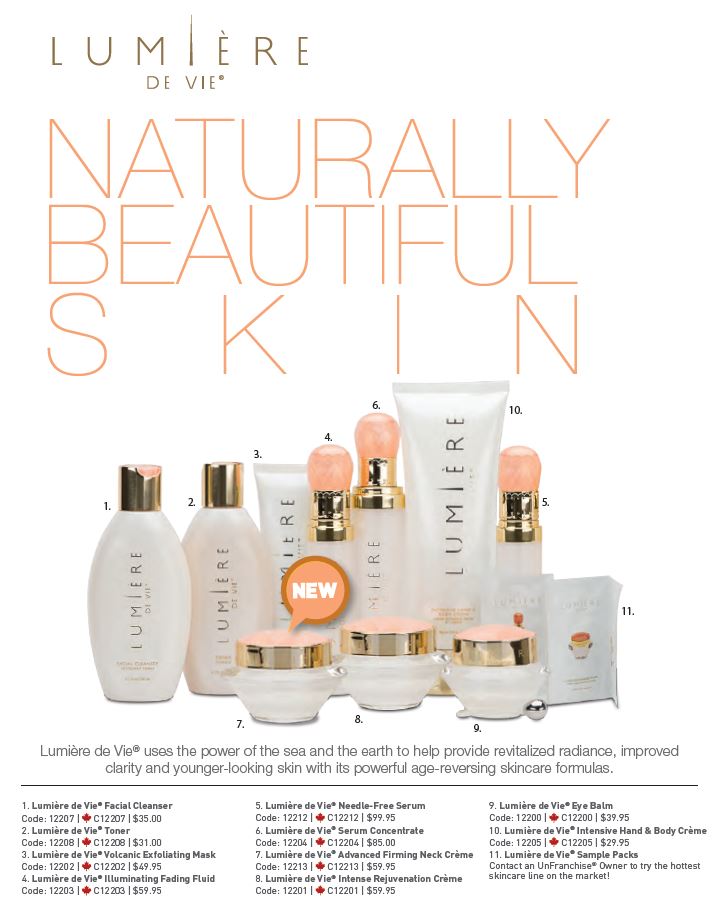
Sign in / Create an Account
Your Shop Consultant
Hongjian Sun
hongjian.sun@hotmail.com
226-246-0760 ![]()
HOW CAN I HELP YOU?

Reference: UnFranchise Owner Magazine May/June 2015
BOOSTING SKIN HEALTH: NUTRITIONALLY AND TOPICALLY
Research studies have shown that the foods we eat and the dietary supplements we take can have a beneficial impact on our skin’s health.
By Robert M. Blair, Ph.D., Strategic Research Scientist
Usually, when we think about taking care of our skin, we think about topical skincare products like cleansers, day creams, night creams and sunscreens. However, this is only part of the battle for maintaining healthy skin. It is also important to avoid overexposure to sunlight and make healthy dietary choices.
One of the more benefi cial dietary supplements for supporting healthy skin is Pycnogenol®, a standardized extract of the bark from the French maritime pine tree. It is rich in procyanidins and phenolic acids that have well-known antioxidant capabilities. A number of studies have now shown that Pycnogenol can boost skin health.
One study reported that supplementation with Pycnogenol daily for eight weeks helped maintain the skin’s resistance to simulated solar ultraviolet rays(1), thus helping to protect the skin from sunburn. A separate double-blind, placebo-controlled study demonstrated that consumption of a dietary supplement containing Pycnogenol (along with additional antioxidant ingredients) helped boost skin elasticity and smoothness(2). A third study in women with melasma reported that consumption of 75 milligrams of Pycnogenol daily for 30 days helped reduce the area and intensity of the hyperpigmentation for a more even skin coloration(3).
The most recent study on Pycnogenol for skin health looked at some of the molecular aspects of Pycnogenol’s benefi ts. In this study, daily consumption of 75 milligrams per day for 12 weeks was shown to improve skin hydration and elasticity in postmenopausal women(4). These benefi ts were possibly due to an observed increase in the expression of genes involved in hyaluronic acid synthesis and collagen synthesis. Together these studies clearly indicate that Pycnogenol can have benefi ts for the skin’s health and appearance.
While our dietary habits are an important part of maintaining our skin health, it remains only part of the equation. Applying topical skincare products is still an essential part of keeping our skin healthy. There are many ingredients from which skincare formulators can choose. Two of the more well-recognized ingredients are panthenol and allantoin.
Panthenol is a stable form of pantothenic acid (vitamin B5) that has been reported to act as a moisturizer by improving skin hydration and reducing transepidermal water loss, thus supporting skin softness and elasticity(5,6). Panthenol-containing formulations have also been shown to maintain skin integrity and reduce transepidermal water loss in irritated skin(7). Additionally, gene expression studies suggest that panthenol might help support wound healing in the skin(8).
Allantoin is widely used in pharmaceutical and cosmetics preparations due to its soothing and healing properties(9). In fact, the benefi ts of allantoin have resulted in its approval by the U.S. FDA as a skin protectant when used at levels of 0.5 – 2 percent in fi nished products. In a group of women with hand dermatitis characterized by varying degrees of redness, roughness, and cracking, application of a lotion containing silicones and 0.2 percent allantoin resulted in 82 percent of the women obtaining complete healing and 14 percent obtaining partial healing(10).
It has long been known that the application of topical skincare products has multiple benefi ts for skin health and appearance. New research over the last several years has also now shown that the foods we eat and supplements we take can also support skin health. Combining these two approaches to skin health is the ideal way to optimize the way your skin looks and feels.
REFERENCES:
1. Saliou C, Rimbach G, Moini H, Mc- Laughlin L, Hossenini S, Lee J, Watson RR, Packer L. Solar ultraviolet-induced erythema in human skin and nuclear factor-kappa-B-dependent gene expression in keratinocytes are modulated by a French Maritime Pine bark extract. Free Radical Biology and Medicine 2001; 30:154-160.
2. Segger D, Schonlau F. Supplementation with Evelle improves skin smoothness and elasticity in a double-blind, placebo-controlled study with 62 women. J Dermatolog Treat 2004; 15(4):222-226.
3. Ni Z, Mu Y, Gulati O. Treatment of melasma with Pynogenol. Phytotherapy Research 2002; 16(6):567-571.
4. Marini A, Grether-Beck S, Jaenicke T, Weber M, Burki C, Formann P, Brenden H, Schönlau F, Krutmann J. Pycnogenol® effects on skin elasticity and hydration coincide with increased gene expressions of collagen Type I and hyaluronic acid synthase in women. Skin Pharmacology & Physiology 2012; 25:86-92.
5. Gehring W, Gloor M. Effect of topically applied dexpanthenol on epidermal barrier function and stratum corneum hydration. Results of a human in vivo study. Arzneimittelforschung 2000; 50(7):659-663.
6. Ebner F, Heller A, Rippke F, Tausch I. Topical use of dexpanthenol in skin disorders. Am J Clin Dermatol 2002; 3(6):427-433.
7. Camargo FB Jr, Gaspar LR, Maia Campos PM. Skin moisturizing effects of panthenol-based formulations. J Cosmet Sci. 2011 Jul-Aug;62(4):361-370.
8. Heise R, Skazik C, Marquardt Y, Czaja K, Sebastian K, Kurschat P, Gan L, Denecke B, Ekanayake-Bohlig S, Wilhelm KP, Merk HF, Baron JM. Dexpanthenol modulates gene expression in skin wound healing in vivo. Skin Pharmacol Physiol 2012; 25(5):241-248.
9. Araujo LU, Reis PG, Barbosa LCO, Saude-Guimaraes DA, Grabe-Guimaraes A, Mosqueira VCF, Carneiro CM, Silva-Barcellos NM. In vivo wound healing effects of Symphytum offi cinale L. leaves extract in different topical formulations. Pharmazie 2012; 67:355-360.
10. LeVan P, Sternberg TH, Newcomer VD. The use of silicones in dermatology. California Medicine 1954; 81:210-213.
Source: magazine - POWERLINE • DECEMBER 2013
HEALTHY SKIN FROM WITHIN
Studies support the idea that nourishing the skin via dietary supplementation yields positive results.
By Robert M. Blair, Ph.D., Strategic Research Scientist
While it is important to take care of our skin this summer with the application of topical products, taking care of our skin by consuming skin-healthy foods and supplements is also important. Some of the more amazing ingredients to keep your skin looking and feeling healthy this summer include Pycnogenol®, vitamin C, resveratrol and hyaluronic acid.
PYCNOGENOL
A number of studies have shown that Pycnogenol can support normal skin health. One of the early studies on Pycnogenol reported that supplementation for eight weeks helped the skin resist the effects of ultraviolet rays1 , suggesting that it can help protect the skin from sunburn. Another study reported that consumption of Pycnogenol helped improve skin hydration and elasticity in postmenopausal women2 . This was possibly due to an observed increase in the expression of genes involved in the synthesis of collagen.
VITAMIN C
Vitamin C is an antioxidant vitamin that is essential for collagen formation. A recent study reported that consumption of vitamin C could increase the skin’s ability to scavenge oxidative free radicals, with a dose of 100 mg vitamin C/day increasing this ability by 22 percent and a dose of 180 mg/ day increasing this ability by 37 percent3 . A population-based study reported that higher vitamin C consumption was associated with a lower likelihood of a wrinkled appearance and reduced skin dryness with age4 . Combining vitamin C supplementation with vitamin E supplementation has been reported to reduce the skin’s sensitivity to sunlight5.
RESVERATROL
Resveratrol is a naturally occurring compound found in various fruits, nuts, and berries, but is most abundant in the skin and seeds of grapes. It is a potent antioxidant that has been reported to have numerous potential health benefi ts including skin health benefi ts. Several in vitro and animal studies have reported that resveratrol can suppress UV-induced skin damage when applied topically6 ; however, few clinical studies have examined the skin health benefi ts of resveratrol supplementation. In one recent study, supplementation with a blend of grape extract (containing 8 mg resveratrol) and pomegranate extract for 60 days resulted in an increase in skin hydration and elasticity and a decrease in skin roughness and wrinkle depth7.
HYALURONIC ACID
Hyaluronic acid is one of the major skin matrix substances in which many of the skin’s components (cells, collagen, elastin, etc.) are embedded, giving structure to the skin. The loss of hyaluronic acid as we age is thought to be partly responsible for wrinkle formation and the loss of elasticity as we get older. To date only a few studies have examined the benefi t of dietary consumption of hyaluronic acid on skin appearance; however, these studies suggest that consumption of hyaluronic acid might help hydrate the skin and give it a smoother appearance8, 9. A small pilot study demonstrated that consumption of a blend of hydrolyzed collagen type II, low-molecular-weight hyaluronic acid, and chondroitin sulfate led to a reduction in skin dryness and a reduction in the appearance of wrinkles10.
While all of these ingredients are excellent choices for supporting healthy summer skin from within, they are also excellent choices to look for in your topical skincare products. Pre-clinical and clinical studies suggest that Pycnogenol, vitamin C, and resveratrol can have anti-aging benefi ts for the skin and protect the skin from UV-induced damage, while hyaluronic acid has been shown to help moisturize the skin at low doses. Combining a topical and dietary approach with skin-healthy ingredients is the ideal approach in order to deliver these ingredients to all the layers of the skin.
REFERENCES
1. Saliou C, Rimbach G, Moini H, McLaughlin L, Hossenini S, Lee J, Watson RR, Packer L. Solar ultraviolet-induced erythema in human skin and nuclear factor-kappa-B-dependent gene expression in keratinocytes are modulated by a French Maritime Pine bark extract. Free Radical Biology and Medicine 2001; 30:154-160.
2. Marini A, Grether-Beck S, Jaenicke T, Weber M, Burki C, Formann P, Brenden H, Schönlau F, Krutmann J. Pycnogenol® effects on skin elasticity and hydration coincide with increased gene expressions of collagen Type I and hyaluronic acid synthase in women. Skin Pharmacology & Physiology 2012; 25:86-92.
3. Lauer AC, Groth N, Haag SF, Darvin ME, Lademann J, Meinke MC. Dose-dependent vitamin C uptake and radical scavenging activity in human skin measured with in vivo electron paramagnetic resonance spectroscopy. Skin Pharmacol Physiol 2013; 26(3):147-154.
4. Cosgrove MC, Franco OH, Granger SP, Murray PG, Mayes AE. Dietary nutrient intakes and skin-aging appearance among middle-aged American women. Am J Clin Nutr 2007; 86(4):1225-1231.
5. Fuchs J, Kern H. Modulation of UV-light-induced skin infl ammation by D-alpha-tocoph erol and L-ascorbic acid: a clinical study using solar-simulated radiation. Free Radic Biol Med 1998; 25(9):1006-1012.
6. Ndiaye M, Philippe C, Mukhtar H, Ahmad N. The grape antioxidant resveratrol for skin disorders: promise, prospects, and challenges. Arch Biochem Biophys 2011; 508(2):164- 170.
7. Buonocore D, Lazzeretti A, Tocabens P, Nobile V, Cestone E, Santin G, Bottone MG, Marzatico F. Resveratrol-procyanidin blend: nutraceutical and antiaging effi cacy evaluated in a placebo-controlled, double-blind study. Clin Cosmetic Invest Dermatol 2012; 5:159-165.
8. Sato T, Sakamoto W, Okanaka W, Yoshida K, Urishibata O. Clinical effects of dietary hyaluronic acid on dry, rough skin. Aesthetic Dermatology 2002; 12:109-120.
9. Kajimoto O, Odanaka W, Sakamoto W, Yoshida K, Takahashi T. Clinical effects of hyaluronic acid diet for dry skin. J New Rem & Clin 2001; 50:90-102.
10. Schwartz SR, Park J. Ingestion of BioCell Collagen ®, a novel hydrolyzed chicken sternal cartilage extract, enhanced blood microcirculation and reduced facial aging signs. Clin Interv Aging 2012; 7:267-273.
Source: magazine - POWERLINE • MAY 2014
SHOP ONLINE TODAY!


Lumière de Vie® Advanced Firming Neck Crème
Lumière de Vie® Needle Free Serum
